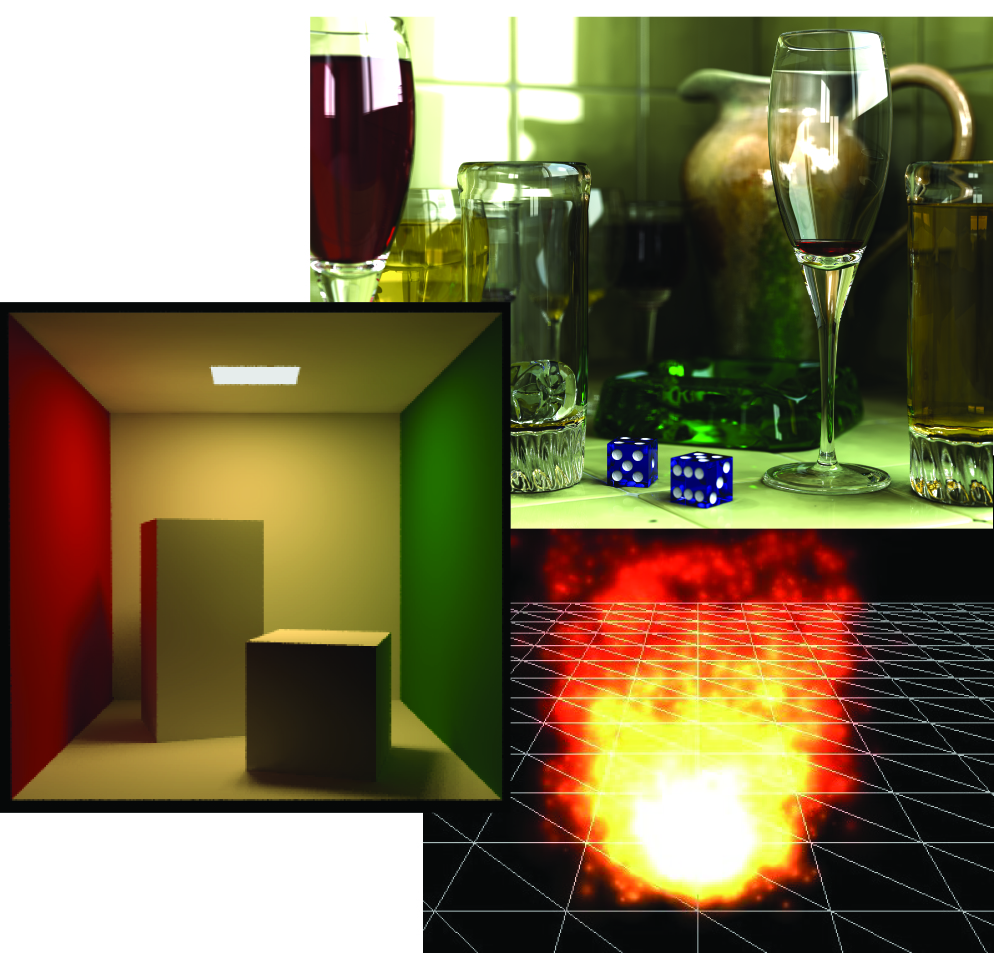Categories
OVERVIEW
CAP5705 is a graduate-level course that presents the concepts and principles  behind current and emerging methods, tools, and techniques in computer graphics. Through programming assignments and written exercises, students will develop a thorough understanding of the field. Topics covered include shading and illumination, sampling and reconstruction, ray tracing, graphics hardware, geometric and viewing transformations, rendering, modeling curves and surfaces and image based methods. The emphasis is on the fundamental concepts, mathematical principles, algorithms and data structures used in computer graphics. If time permits, students will be introduced to an overview of advanced topics in computer graphics research.
behind current and emerging methods, tools, and techniques in computer graphics. Through programming assignments and written exercises, students will develop a thorough understanding of the field. Topics covered include shading and illumination, sampling and reconstruction, ray tracing, graphics hardware, geometric and viewing transformations, rendering, modeling curves and surfaces and image based methods. The emphasis is on the fundamental concepts, mathematical principles, algorithms and data structures used in computer graphics. If time permits, students will be introduced to an overview of advanced topics in computer graphics research.
Instructor: Dr. Corey Toler-Franklin, CISE Department, University of Florida
Contact: Office CSE 332, Lab CSE 319, ctoler@cise.ufl.edu
Office Hours: MWF Period 7 (2:00 – 2:50 pm) and by appointment
Teaching Assistant: TBD email: Office Hours:
Location: FLG 285
Time: MWF Period 8 (3:00pm – 3:50pm)
Course Management: Canvas
Website: https://toler-franklin.com/course/cap-5705-computer-graphics-fall-2017/
PREREQUISITES:
Data Structures and Algorithms. Basic knowledge of algorithms, data structures and discrete math. Central concepts require matrix operations, composition and parametrization of curves and surfaces. Students should be able to program using a high-level language. Familiarity with C or C++ is helpful — otherwise the learning curve is quite steep in the first weeks. Familiarity with OpenGL is not assumed. The mathematical underpinnings and OpenGL practice are emphasized.
**Contact instructor if you are not sure you are prepared for the course**
SYLLABUS
TEXTBOOKS
Required
  |
Marschner & Shirley,
Fourth Edition ISBN: 1482229390 (Available online) |
  |
DAVE SHREINER, GRAHAM SELLERS, JOHN M. KESSENICH, BILL M. LICEA-KANE
ISBN: 0321773039 Publisher: ADDISON-WESLEY Edition: LATEST (Available online) |
COURSEWORK
All assignments are distributed and submitted in Canvas.
30% Programming Assignments
20% Final Programming Project
20% Written Homework Assignments
15% Exam 1
15% Exam 2
Programming Assignments
GLSL Programing
Overview
Shader programs are essential components of the modern OpenGL pipeline. You will use the OpenGL shader language, GLSL, to implement shader programs that process high level algorithms efficiently using the graphics processing unit (GPU). You will be evaluated on (1) source code com- pletion and correctness 30% (2) reflectance direction calculation 10% (3) cube map 20% (4) texture lookup 20% (5) result image 10% and (6) written report 10%.
Detailed Syllabus: Posted on Canvas
———————————————————
ACADEMIC INTEGRITY
The work you submit must be your own. Although it is fine to have some level of discussion with piers on assignments, the work you submit must be your own. You may work in groups of 2 or 3 for the final project but all other work should be done individually. DO NOT POST SOLUTIONS TO PROBLEMS AND PROGRAMMING ASSIGNMENTS ONLINE!
MANDATORY HONESTY STATEMENT:
All students admitted to the University of Florida have signed a statement of academic honesty committing themselves to be honest in all academic work and understanding that failure to comply with this commitment will result in disciplinary action. This statement is a reminder to uphold your obligation as a UF student and to be honest in all work submitted and exams taken in this course and all others.
DISABILITIES:
Students Requesting classroom accommodation must first register with the Dean of Students Office. That office will provide the student with documentation that he/she must provide to the course instructor when requesting accommodation.
UF Counseling Services:
Resources are available on-campus for students having personal problems or lacking clear career and academic goals. The resources include: UF Counseling & Wellness Center, 3190 Radio Rd, 392-1575, psychological and psychiatric services. Career Resource Center, Reitz Union, 392-1601, career and job search services.
MANDATORY SOFTWARE USE STATEMENT:
All faculty, staff and student of the University are required and expected to obey the laws and legal agreements governing software use. Failure to do so can lead to monetary damages and/or criminal penalties for the individual violator. Because such violations are also against University policies and rules, disciplinary action will be taken as appropriate. We, the members of the University of Florida community, pledge to uphold ourselves and our peers to the highest standards of honesty and integrity.



